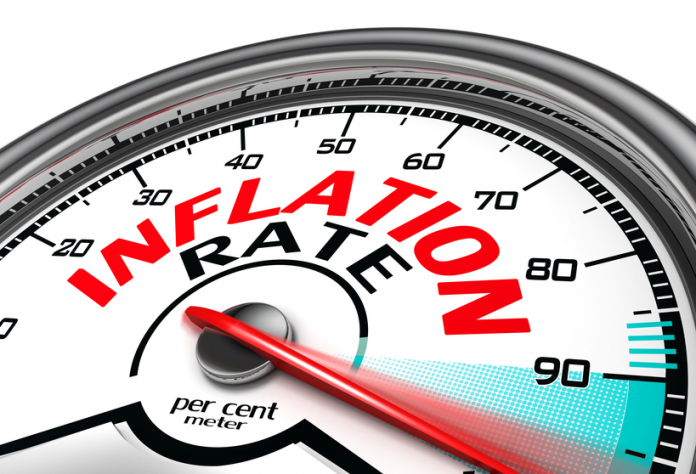Finance
BREAKING: Inflation Rate Jumps to 34.19% in June
Published
2 years agoon

Nigeria’s inflation rate increased to 34.19% in June 2024, according to data released by the National Bureau of Statistics (NBS) on Monday, June 15, 2024.
Looking at the movement, the June headline inflation rate showed an increase of 0.24% points when compared to the May 2024 headline inflation rate when it read 33.95%.
Read Also:
The latest NBS data showed that on a year-on-year basis, inflation rate was 11.40% points higher compared to the rate recorded in June 2023, which was 22.79%.
This shows that the headline inflation rate, year-on-year basis, increased in the month of June 2024 when compared to the same month in the preceding year, June 2023.
Furthermore, on a month-on-month basis, the headline inflation rate in June 2024 was 2.31%, which was 0.17% higher than the rate recorded in May 2024 (2.14%). This means that in the month of June 2024, the rate of increase in the average price level is higher than the rate of increase in the average price level in May 2024.
The latest figure indicates a halt to the slowing increase of prices of goods and services in the country experienced in the last three consecutive months.
Food prices as a major driver
The high cost of food items in the country has remained a major driver of inflation as Nigerians commit a major chunk of their household income to buying foods.
This trend continued in June as food inflation was 40.87% on a year-on-year basis, which was 15.62% points higher compared to the rate recorded in June 2023 (25.25%).
The rise in food inflation on a year-on-year basis was caused by increases in prices of the staples such as millet whole grain, garri, guinea corn, Bread, Cereals Class, Yam, Water Yam, Coco Yam (Potatoes, Yam & Other Tubers Class), Groundnut Oil, Palm Oil, etc (Oil & Fats Class) and Catfish Dried, Dried Fish-Sadine, Mudfish (Fish Class), etc.
On a month-on-month basis, the food inflation rate in June 2024 was 2.55% which shows a 0.26% increase compared to the rate recorded 2.28% in the preceding month, May.
The latest CPI report showed that average annual rate of food inflation for the twelve months ending June 2024 over the previous twelve-month average was 35.35%, which was an 11.31% points increase from the average annual rate of change recorded in June 2023 (24.03%).
Reverse of respite
The accelerated inflation rate has jeopardised the brief relief seen in the prior three months when headline inflation decelerated to indicate a respite in the high costs of goods and services in the country.
Headline inflation decelerated in May to 2.14% from a month earlier, slowing from 2.29% in April and 3.02% in March, according to NBS reports for the months.
By growing 2.31% in June from a lower rate of2.14% in May, this negates the conviction earlier expressed by the Central Bank of Nigeria (CBN) that a combination of tighter monetary policy and appropriate coordinated fiscal measures from the federal government will prove effective in arresting the sharp increase in the cost of living that has afflicted Nigerians since the aftermath of the Covid epidemic.
In response to the ongoing inflationary pressures, the Nigerian government has unveiled a comprehensive plan for 2024, focusing on the six-month suspension of import duties, Value Added Tax (VAT), and other tariffs on staple food items, raw materials, and direct inputs for manufacturing.
This includes agricultural production inputs such as fertilisers, seedlings, and chemicals, as well as pharmaceutical products, poultry feeds, flour, and grains. Additionally, rice millers will be authorised to import paddy rice at zero duty and VAT for an initial six-month period to boost local supply and capacity utilisation.
However, the effectiveness of these initiatives in delivering tangible benefits remains to be seen.
As the next Monetary Policy Committee meeting approaches, the CBN faces a dilemma of whether to continue tightening monetary policy or adopt a more cautious approach to monitor inflationary trends and key economic indicators.
Share this:
- Click to share on X (Opens in new window) X
- Click to share on Facebook (Opens in new window) Facebook
- Click to share on WhatsApp (Opens in new window) WhatsApp
- Click to share on Pocket (Opens in new window) Pocket
- Click to share on Telegram (Opens in new window) Telegram
- Click to email a link to a friend (Opens in new window) Email
- Click to share on LinkedIn (Opens in new window) LinkedIn
You may like


Nigerian Banks Set New Target to Respond to Frauds


Nigeria’s Inflation Decline to 15.15% in December 2025 Ignites Questions of Sustainability


NCC, CBN Introduce 30-Second Refund Rule for Failed Airtime and Data Purchases


Nigeria’s Inflation Moderates to 14.45% in November


Banks’ N1.96Trn Black Hole: Who Took the Loans, Who Defaulted, and Why the Real Economy Suffers


How Policy Missteps Weigh Down Nigeria’s Fragile Banking Giants












